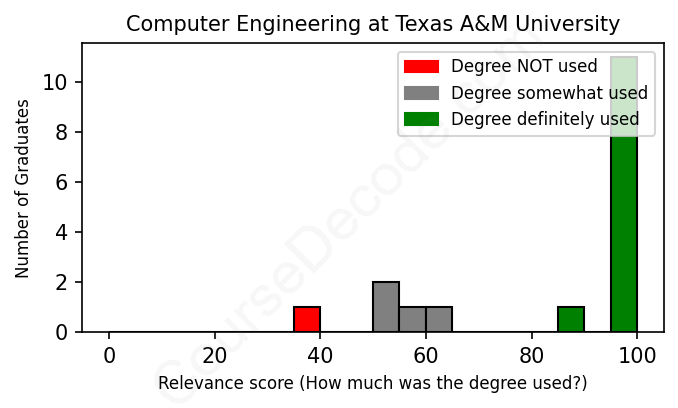
First, some facts. Of the Computer Engineering graduates from Texas A&M University we've analyzed , here's how many have used (or NOT used) their degree in their career:

These are estimates based on AI analysis of 17 LinkedIn profiles (see below).
The verdict? Significantly above average. Overall, with an average relevance score of 85%, Computer Engineering graduates from Texas A&M University have a much higher likelihood (+18%) of finding work in this field compared to the average graduate across all fields:
And for comparison, here's the chart for all profiles we've looked at across all degrees.
Also, after graduating, only 17% of these graduates have pursued further education other than another Bachelor's degree (such as a Masters degree or other), compared to the average across all profiles of 35%. This suggests a Bachelors degree is enough for most Computer Engineering graduates, and it's normal to look for work straight after graduation.
See the details:
|
Relevance score: 100% We think this person has gone into a career highly relevant to their degree. We think this person has gone into a career highly relevant to their degree.
DEGREE INFOGraduated in 2020 from Texas A&M University with a Bachelor's degree in Computer Engineering. No other secondary education since. JOB HISTORY SINCE GRADUATIONSoftware Developer Epic Jul 2020 - Present ABOUTTexas A&M graduate with a B.S. in Computer Engineering. Currently working as a software developer, with experience in both front end and back end development. |
The top 10 most common jobs done by the graduates we've analyzed (ranked most common to least) are:
From analyzing the LinkedIn profiles of Texas A&M University graduates with a degree in Computer Engineering, it’s clear that many have ventured into a wide variety of job roles. A notable trend is that while some graduates have found positions directly relevant to their field—like Software Developers, Cybersecurity Analysts, and R&D Engineers—others have taken paths that seem quite far from computer engineering. Jobs like Managers in Operations or roles in Real Estate do not typically utilize the technical skills associated with a Computer Engineering background. Moreover, the prevalence of consulting roles suggests that some graduates are leaning more towards business applications than technical engineering.
Overall, while a good number of graduates have landed jobs that apply their Computer Engineering expertise, there's a significant proportion working in roles that may not directly leverage their technical training. Some tech-related positions, particularly in software development and cybersecurity, make great use of their skills. But, it's apparent that graduates are also exploring diverse avenues outside strict computer engineering paths, showing that a degree in this field can offer versatility in the job market. So, if you’re considering a degree in Computer Engineering, know that it could lead you to a broad range of job opportunities, some directly related and others that might surprise you!
Here is a visual representation of the most common words in job titles for Computer Engineering graduates (this is across all Computer Engineering graduates we've analyzed, not just those who went to Texas A&M University):

Graduates from Texas A&M University's Computer Engineering program generally appear to have solid career trajectories that align with their degree. Many of them land first jobs in relevant fields, such as software development, consulting, and various IT roles. For instance, graduates from 2020 and onward are often stepping into positions like Software Developers at established companies like Epic and Intel, showcasing a strong connection to tech roles straight out of school. Others take on consulting positions or specialized roles in cybersecurity, indicating that their skillset is highly valued by employers right from the start.
As these graduates gain experience, their career paths seem to diversify but largely remain within the tech realm. Those who graduated around 2016 to 2018 have transitioned into managerial and senior consultant roles, highlighting their growth and how organizations trust them with more responsibility. Five to ten years post-graduation, many have advanced to positions such as Senior Leaders or Consultants at notable companies, while some have even started their own ventures. This suggests that a Computer Engineering degree from Texas A&M doesn't just launch graduates into their first job; it sets a pathway for long-term career development and success in various tech-centric industries.
Getting a Bachelor’s degree in Computer Engineering at Texas A&M is definitely no walk in the park, but it's not impossible either! It’s a pretty demanding program that combines both computer science and electrical engineering, so you’ll be tackling some challenging math and programming concepts along the way. The coursework can be intense, with lots of projects, labs, and tough exams, especially as you get deeper into your major. But if you're passionate about tech and enjoy problem-solving, you might find it really rewarding. Just be prepared to put in the time and effort, and you’ll find your groove! Overall, it's about average in terms of difficulty compared to other engineering disciplines, so if you like a good challenge, it's a good fit.
Most commonly, in the LinkedIn profiles we've looked at, it takes people 4 years to finish a Bachelor degree in Computer Engineering.
Looking at the job paths of these Texas A&M grads, it seems like they're generally doing pretty well in terms of making decent money, especially compared to many other fields. Those with more experience are holding positions like Senior Consultant and Software Development Engineer at reputable companies, which typically pay well. Even recent grads starting out as interns are landing jobs at big names like Lockheed Martin and PwC, which usually means they're setting themselves up for solid salaries down the road. Sure, not everyone is in high-paying roles right away, but many seem to be moving up the ladder quickly, so yeah, overall, it looks like a good investment in their education has paid off!
Here is a visual representation of the most common words seen in the "about" section of LinkedIn profiles who have a Bachelor degree in Computer Engineering (this is across all Computer Engineering graduates we've analyzed, not just those who went to Texas A&M University). This may or may not be useful:

Here are all colleges offering a Bachelor degree in Computer Engineering (ordered by the average relevance score of their Computer Engineering graduates, best to worst) where we have analyzed at least 10 of their graduates:
| College | Score | Count |
|---|---|---|
 University of Florida University of Florida
|
95 | 18 |
 Michigan State University Michigan State University
|
94 | 10 |
 Brigham Young University Brigham Young University
|
94 | 10 |
 Penn State University Penn State University
|
92 | 14 |
 California Polytechnic State University-San Luis Obispo California Polytechnic State University-San Luis Obispo
|
91 | 14 |
 University of Central Florida University of Central Florida
|
90 | 14 |
 Georgia Institute of Technology Georgia Institute of Technology
|
90 | 14 |
 Purdue University Purdue University
|
86 | 34 |
 University of Illinois at Urbana-Champaign University of Illinois at Urbana-Champaign
|
86 | 30 |
 Iowa State University Iowa State University
|
86 | 25 |
 Texas A&M University Texas A&M University
|
85 | 17 |
 San Jose State University San Jose State University
|
85 | 16 |
 Clemson University Clemson University
|
85 | 14 |
 Dwarkadas J. Sanghvi College of Engineering Dwarkadas J. Sanghvi College of Engineering
|
85 | 10 |
 North Dakota State University North Dakota State University
|
84 | 12 |
 Savitribai Phule Pune University Savitribai Phule Pune University
|
83 | 25 |
 University of Mumbai University of Mumbai
|
82 | 43 |
 New Jersey Institute of Technology New Jersey Institute of Technology
|
81 | 11 |
 University of North Carolina at Charlotte University of North Carolina at Charlotte
|
79 | 11 |
 California State Polytechnic University-Pomona California State Polytechnic University-Pomona
|
76 | 11 |
 The University of Texas at Dallas The University of Texas at Dallas
|
76 | 18 |
 University of South Florida University of South Florida
|
69 | 10 |
 Gujarat Technological University, Ahmedbabd Gujarat Technological University, Ahmedbabd
|
55 | 13 |